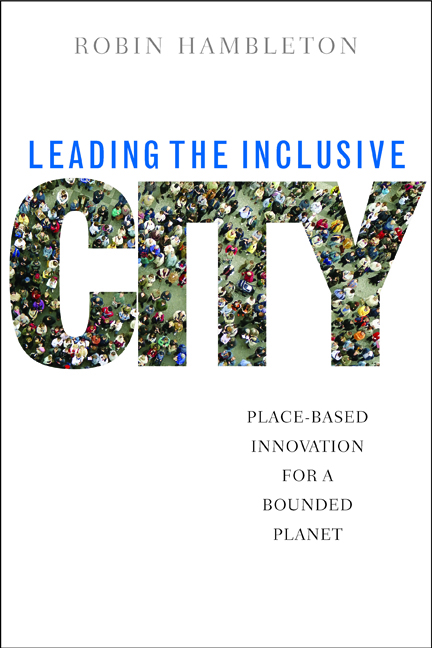Book contents
- Frontmatter
- Dedication
- Contents
- List of figures
- List of innovation stories
- About the author
- Preface
- A guide to the book
- Overview
- Part 1 Diagnosis: Understanding trends and challenges
- Part 2 Concepts: Place, leadership, innovation and democratic governance
- Part 3 Experiences: Place-based leadership in action
- Part 4 Lesson drawing: Insights and international learning
- Notes
- Appendix: International city networks and resources
- Acknowledgements
- References
- Index
One - Place-based leadership and the inclusive city
Published online by Cambridge University Press: 08 March 2022
- Frontmatter
- Dedication
- Contents
- List of figures
- List of innovation stories
- About the author
- Preface
- A guide to the book
- Overview
- Part 1 Diagnosis: Understanding trends and challenges
- Part 2 Concepts: Place, leadership, innovation and democratic governance
- Part 3 Experiences: Place-based leadership in action
- Part 4 Lesson drawing: Insights and international learning
- Notes
- Appendix: International city networks and resources
- Acknowledgements
- References
- Index
Summary
Thus the public ruin invades the house of each citizen, and the courtyard doors no longer have the strength to keep it away, as it leaps over the lofty wall. And though a man runs in and tries to hide in chamber or closet, it ferrets him out Solon, c. 600 BC, on the evils of bad government
Introduction
City leaders, and all those concerned with the governance of urban areas, face unprecedented challenges. This book will identify and discuss many of them. The aim here, however, is not simply to provide an international examination of urban trends and emerging problems. The literature on city planning and urban politics already offers many valuable insights on urban dynamics and public policy making for cities, including numerous texts exploring the ecological as well as the social dangers inherent in current approaches to planning and urban development.
This book is informed by this literature, but it will attempt to go beyond the normal territory of social scientific analysis and critique. By introducing concepts and ideas drawn from different disciplines, and by drawing on the experience of some of the most innovative cities in the world, the book aims to stimulate practical efforts to improve the quality of life in cities. More specifically it sets out to advance the cause of social inclusion in modern societies by highlighting the contribution that place-based leadership can make in tackling social and environmental ills.
This book, then, has a normative stance. It aims to support efforts to change urban policies and practices so that they foster the creation of more inclusive cities. It has an ideological position in line with what Albert Hirschman (1971) calls a ‘bias for hope’. It explores the role of place-based leadership in public policy making, and presents practical examples illustrating how civic leadership has promoted more inclusive approaches in specific cities and neighbourhoods. I will explain what I mean by ‘place-based leadership’ and ‘inclusive cities’ shortly. At the outset, however, I am suggesting that scholars, and I include here students as well as qualified academics, can play an important role in assisting those charged with making decisions about cities.
- Type
- Chapter
- Information
- Leading the Inclusive CityPlace-Based Innovation for a Bounded Planet, pp. 3 - 32Publisher: Bristol University PressPrint publication year: 2014



